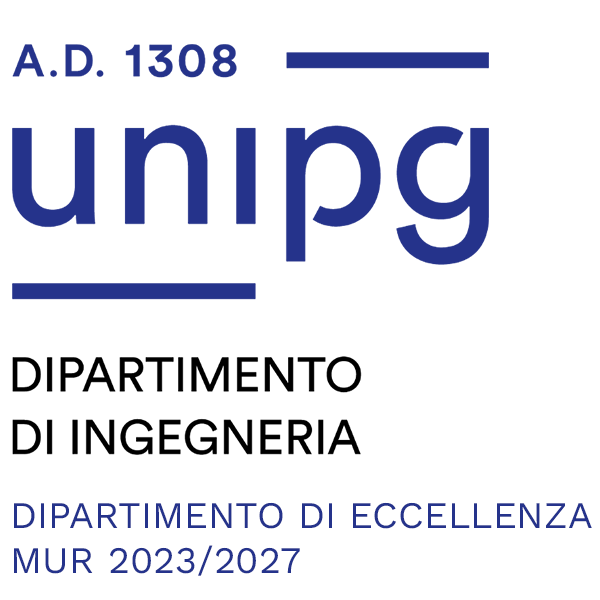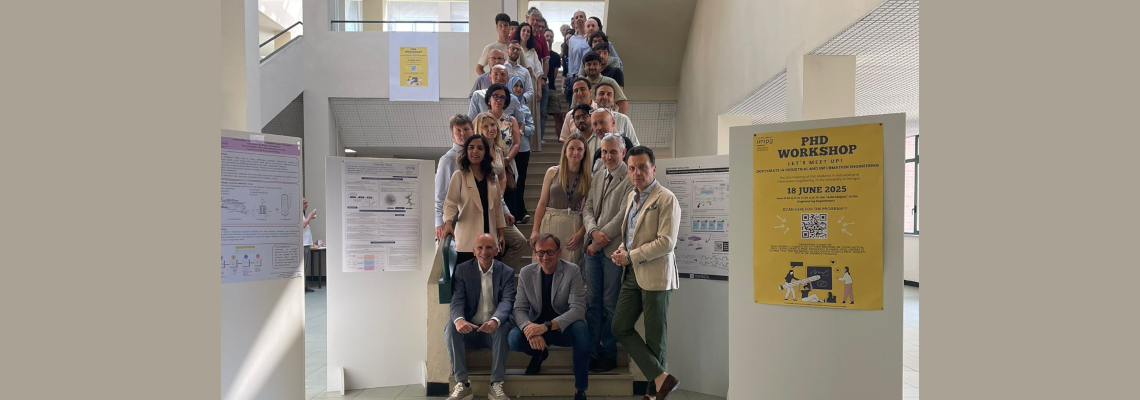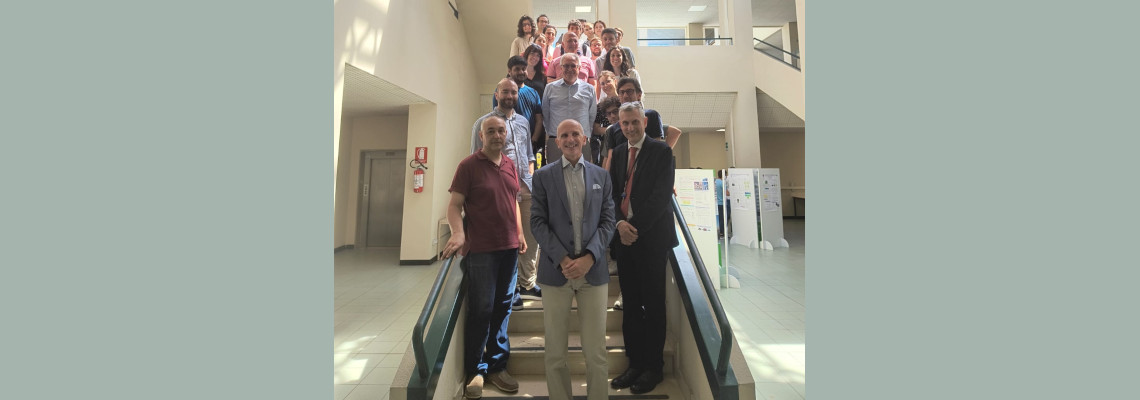The PhD is the highest level of degree in Italy, or third-level degree, and is therefore achievable only by those who already have a second-level or equivalent degree. The Department of Engineering of the University of Perugia offers a PhD Course in Industrial and Information Engineering. For information on the Calls, Fees, Fellowships, and related forms, please refer to the PhD page of the University of Perugia portal.
DOCTORATE IN INDUSTRIAL AND INFORMATION ENGINEERING
Description and objectives of the course
The PhD Course in Industrial and Information Engineering aims to study and develop new models and technologies in the various scientific sectors the Department covers. The course is divided into two distinct curricula, Curriculum in Industrial Engineering and Curriculum in Information Engineering, but at the same time, it offers common training and seminar activities. The training and research activities foster close collaboration with professors of other departments and other Italian and foreign universities. The training activity, organized in credits (CF - crediti formativi), has the primary objective of developing the research attitudes of Doctoral students.
Specific Competences
- The Curriculum in Industrial Engineering provides skills on research and new design methodologies specifically oriented toward the fields of energy systems, industrial plants, mechanical design, mechanical technology, mechanical measurements, and electrical engineering.
- The Curriculum in Information Engineering provides skills on research and new design methodologies specifically oriented toward the fields of electronics, electronic measurements, signal propagation, telecommunications, computer science, and automation.
Contacts
- Coordinator: Prof. Giuseppe Liotta
- Email: This email address is being protected from spambots. You need JavaScript enabled to view it.
- Tel: +39 075 5853685
- Secretary: Dott.ssa Elisabetta Buonumori
- Email: This email address is being protected from spambots. You need JavaScript enabled to view it.
- Tel: +39 075 5853604, Fax: +39 075 5853606
Guidelines and information on study abroad
These Guidelines describes in detail the training activities planned during the three years and the related credit acquisition mechanisms. The Guidelines also provides precise information on the requirements and methods for passing each course year and for obtaining the final doctoral degree.
- Doctoral Regulation applied from the XL cycle (enrollment from Jan. 2025)
- Annual Report on the PhD Activity (Annex 1)
- Doctoral Regulation applied from the XXXIX cycle (enrollment from Nov. 2023)
- Annual Report on the PhD Activity (Annex 1)
- Doctoral Regulation applied from the XXXVIII cycle (enrollment from Nov. 2022)
- Annual Report on the PhD Activity (Annex 1)
- Information on how to organize your period of study abroad
CICLO XLI - A.A. 2025/2026
- Composition of the teaching staff [pdf]
- Training activities
- The organization of the training activity is described in detail in the Regulation and is common to the two curricula. The next table reports the distribution of the minimum credits expected in the three years of the course:
For additional details, please see the Doctoral Regulation.Expected CFU Type of activity I Year II Year III Year Doctoral modules 9 6 Multi/inter/trans-disciplinary modules 2 2 2 Congresses, seminars, and doctoral schools 1 4 4 Total 12 12 6 - List of PhD teaching modules
- The organization of the training activity is described in detail in the Regulation and is common to the two curricula. The next table reports the distribution of the minimum credits expected in the three years of the course:
- Student list [pdf]
CYCLE XL - Academic Year 2024/2025
- Composition of the teaching staff [pdf]
- Training activities
- The organization of the training activity is described in detail in the Regulation and is common to the two curricula. The next table reports the distribution of the minimum credits expected in the three years of the course:
For additional details, please see the Doctoral Regulation.Expected CFU Type of activity I Year II Year III Year Doctoral modules 9 6 Multi/inter/trans-disciplinary modules 2 2 2 Congresses, seminars, and doctoral schools 1 4 4 Total 12 12 6 - List of PhD teaching modules
- The organization of the training activity is described in detail in the Regulation and is common to the two curricula. The next table reports the distribution of the minimum credits expected in the three years of the course:
- Student list [pdf]
CYCLE XXXIX - Academic Year 2023/2024
- Composition of the teaching staff [pdf]
- Training activities
- The organization of the training activity is described in detail in the Regulation and is common to the two curricula. It consists of:
(1) Basic research training (includes training activities within master degree courses and doctoral teaching modules – see list of teaching modules below);
(2) Specialistic research training (includes the acquisition of specialistic scientific skills, participation in schools, seminars, and congresses, as well as a period of training and research in foreign universities or research institutions);
(3) Research activity (includes writing of the thesis and publications in congresses and scientific journals).
These activities are distributed over the three years of the doctoral course as follows:- First Year: 23 CF in the activity type (1); 18 CF in the activity type (2); 20 CF in the activity type (3).
- Second Year: 10 CF in the activity type (1); 24 CF in the activity type (2); 25 CF in the activity type (3).
- Third Year: 15 CF in the activity type (2); 45 CF in the activity type (3).
- List of PhD teaching modules
- The organization of the training activity is described in detail in the Regulation and is common to the two curricula. It consists of:
- Call for application (see also the ENGLISH VERSION section on this page for futher related documents)
- Student list [pdf]
CYCLE XXXVIII - Academic Year 2022/2023
- Composition of the teaching staff [pdf]
- Training activities
- The organization of the training activity is described in detail in the Regulation and is common to the two curricula. It consists of:
(1) Basic research training (includes training activities within master degree courses and doctoral teaching modules – see list of teaching modules below);
(2) Specialistic research training (includes the acquisition of specialistic scientific skills, participation in schools, seminars, and congresses, as well as a period of training and research in foreign universities or research institutions);
(3) Research activity (includes writing of the thesis and publications in congresses and scientific journals).
These activities are distributed over the three years of the doctoral course as follows:- First Year: 23 CF in the activity type (1); 18 CF in the activity type (2); 20 CF in the activity type (3).
- Second Year: 10 CF in the activity type (1); 24 CF in the activity type (2); 25 CF in the activity type (3).
- Third Year: 15 CF in the activity type (2); 45 CF in the activity type (3).
- List of PhD teaching modules
- The organization of the training activity is described in detail in the Regulation and is common to the two curricula. It consists of:
- Call for application (see also the ENGLISH VERSION section on this page for futher related documents)
- Student list [pdf]
- Procedure for achieving the Ph.D. Degree
CYCLE XXXVII - Academic Year 2021/2022
- Training activities
- The organization of the training activity is described in detail in the Regulation and is common to the two curricula. It consists of:
(1) Basic research training (includes training activities within master degree courses and doctoral teaching modules – see list of teaching modules below);
(2) Specialistic research training (includes the acquisition of specialistic scientific skills, participation in schools, seminars, and congresses, as well as a period of training and research in foreign universities or research institutions);
(3) Research activity (includes writing of the thesis and publications in congresses and scientific journals).
These activities are distributed over the three years of the doctoral course as follows:- First Year: 23 CF in the activity type (1); 18 CF in the activity type (2); 20 CF in the activity type (3).
- Second Year: 10 CF in the activity type (1); 24 CF in the activity type (2); 25 CF in the activity type (3).
- Third Year: 15 CF in the activity type (2); 45 CF in the activity type (3).
- List of PhD teaching modules [pdf] (Updated on 08/24/2021)
- The organization of the training activity is described in detail in the Regulation and is common to the two curricula. It consists of:
- Call for application
- Student list [pdf]
CYCLE XXXVI - Academic Year 2020/2021
- Composition of the teaching staff [pdf]
- Topics
- Training activities
- The organization of the training activity is described in detail in the Regulation and is common to the two curricula. It consists of:
(1) Basic research training (includes training activities within master degree courses and doctoral teaching modules – see list of teaching modules below);
(2) Specialistic research training (includes the acquisition of specialistic scientific skills, participation in schools, seminars, and congresses, as well as a period of training and research in foreign universities or research institutions);
(3) Research activity (includes writing of the thesis and publications in congresses and scientific journals).
These activities are distributed over the three years of the doctoral course as follows:- First Year: 23 CF in the activity type (1); 18 CF in the activity type (2); 20 CF in the activity type (3).
- Second Year: 10 CF in the activity type (1); 24 CF in the activity type (2); 25 CF in the activity type (3).
- Third Year: 15 CF in the activity type (2); 45 CF in the activity type (3).
- List of PhD teaching modules [pdf]
- Call for application
- Student list [pdf]
- The organization of the training activity is described in detail in the Regulation and is common to the two curricula. It consists of:
CYCLE XXXV - Academic Year 2019/2020
- Composition of the teaching staff [pdf]
- Topics
- Training activities
- The organization of the training activity is described in detail in the Regulation and is common to the two curricula. It consists of:
(1) Basic research training (includes training activities within master degree courses and doctoral teaching modules – see list of teaching modules below);
(2) Specialistic research training (includes the acquisition of specialistic scientific skills, participation in schools, seminars, and congresses, as well as a period of training and research in foreign universities or research institutions);
(3) Research activity (includes writing of the thesis and publications in congresses and scientific journals).
These activities are distributed over the three years of the doctoral course as follows:- First Year: 23 CF in the activity type (1); 18 CF in the activity type (2); 20 CF in the activity type (3).
- Second Year: 10 CF in the activity type (1); 24 CF in the activity type (2); 25 CF in the activity type (3).
- Third Year: 15 CF in the activity type (2); 45 CF in the activity type (3).
- List of PhD teaching modules [pdf]
- Call for application
- Student list [pdf]
- The organization of the training activity is described in detail in the Regulation and is common to the two curricula. It consists of:
Previous cycles
- XXXIV CYCLE
- XXXIII CYCLE
- XXXII CYCLE
- XXXI CYCLE
- XXX CYCLE
- Student list
- Composition of the teaching staff
- XXIX CYCLE






